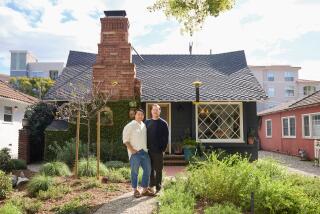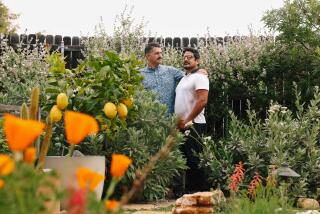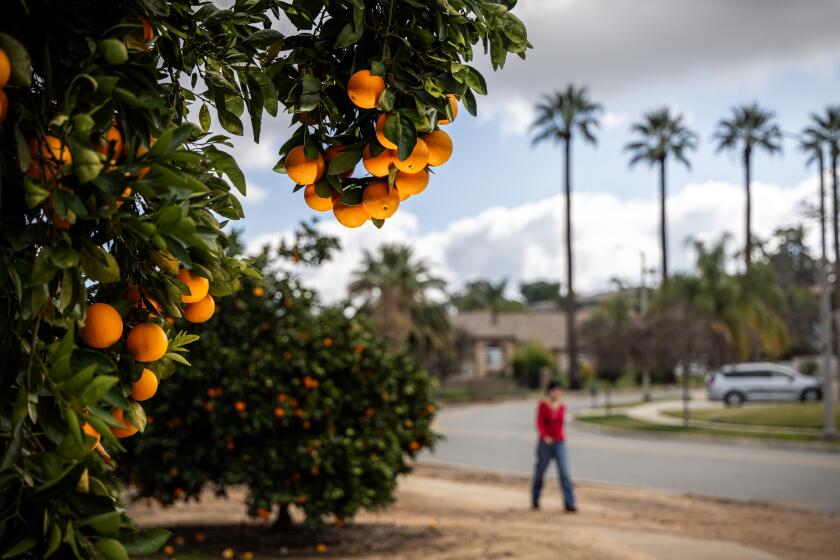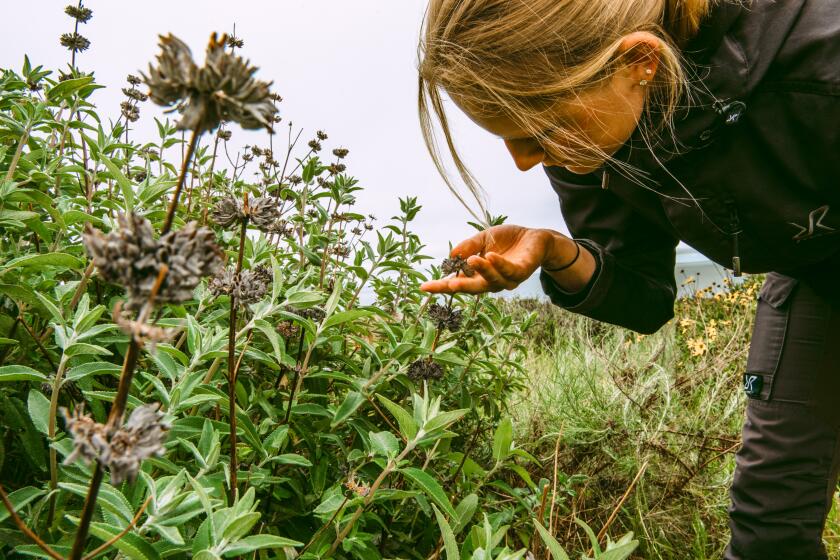An urban farm grows in Los Angeles. You can be a part of it.
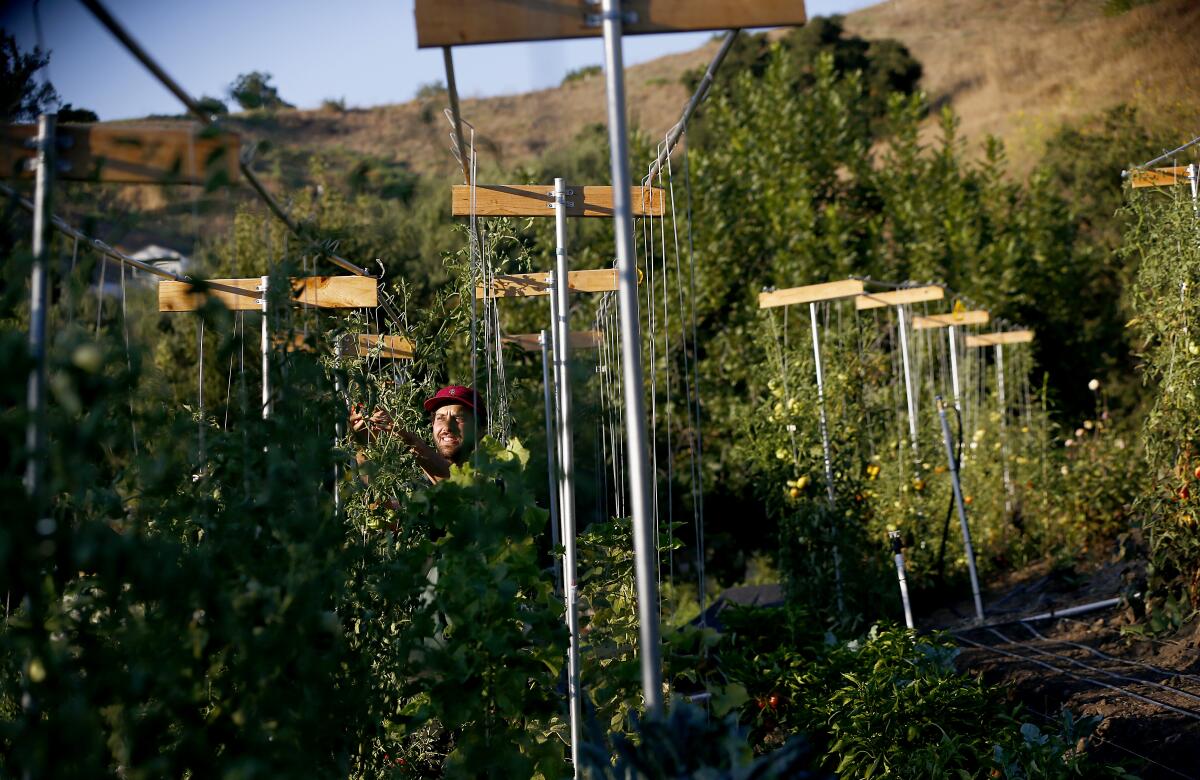
Finding the Avenue 33 Farm is a serious challenge. Plug the address into GPS and you end up on a steep residential street packed with older, neatly landscaped homes. To the west, downtown L.A. fills the horizon and, to the south, your destination looks like a modest home with a slightly scruffy frontyard and a long, sloping driveway that ends with a carport.
How can this be the site of a farm?
The answer lies above, an arduous climb up the hill behind the home of farmers Ali Greer and Eric Tomassini, past the covered patio, with the new walk-in refrigerator Tomassini built the week before, past barrels of rainwater and flats of seedlings waiting to be planted, up another set of stairs to an acre-wide sprawl of flowers, tomatoes, peppers and lettuce basking in the sun.
There are fruit trees too, along with new rows of carrots and beets tucked in among the taller plants, a sump pump for gray water and giant piles of compost. A rickety bistro table and chairs perch precariously on a short ledge of mostly flat ground, and chirping birds flit endlessly in and out of oak and black walnut trees that line the perimeter.
“When we call our family on speakerphone, they say it sounds like Snow White’s birds,” Tomassini said, laughing, “because that’s all they can hear.”
Clearly, this is a working farm, but you’d better be sturdy on your feet.

Tomassini, 31, a lanky man who tilled this ground by hand last fall using a broad fork tool to loosen the soil, admits the uneven terrain can be a challenge. The first time he spent a day balancing on the hill, “I woke up the next morning to aching knees,” he said. “But in L.A., if you find a piece of land that’s not insanely expensive, it’s on a hill, with no road access, that’s essentially unbuildable.”
Which doesn’t mean it should be unusable, say Tomassini and his wife. They point to the brown hills across the street, which the city pays to clear every year to avoid fire problems. “Why not have it be productive, profitable land, growing food?” Tomassini said. “My dream is to see a lot more urban farms in L.A., especially on hillsides. I hope to show that it’s a financially viable option to grow food on hillsides that are tough to build on.”
The two became a couple 11 years ago in Colorado, where they were attending the University of Colorado at Boulder. Greer, 32, was from Minneapolis, with an avid interest in filmmaking and urban farming. Tomassini, who grew up outside Philadelphia, had come to learn about farming, trading food he grew for a place to sleep. Eventually, he said, he learned how to prepare all that fresh food and supported his farming habit by becoming a chef at local restaurants. “I looked at cooking as the only way I could afford the food I wanted to eat,” he said. “If you work 80 hours a week for eight years, you can jam a lot in.”
The day they met, they discovered their mutual geekiness on a tree walk through Boulder. “Everybody was over 60 but me and Eric,” Greer said, grinning at her husband, who smiled back as he pinned tomato branches to a trellis.
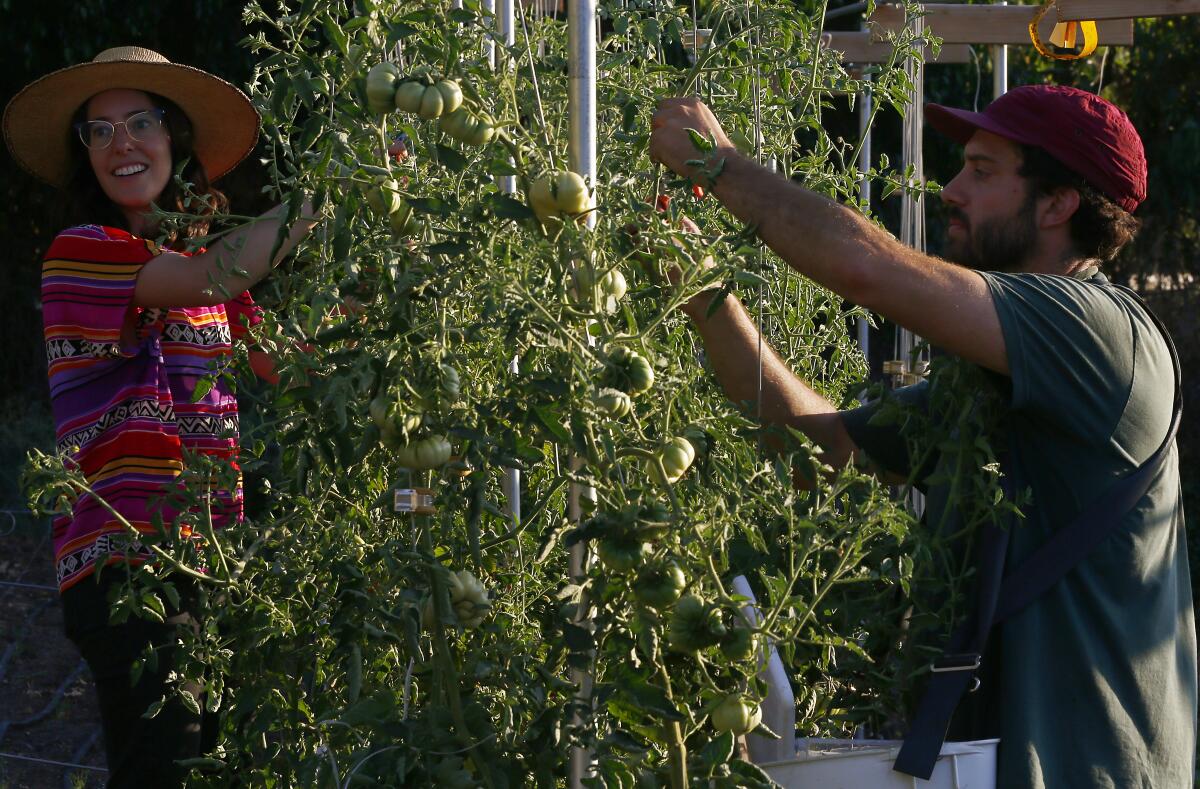
on a hill behind their home in Lincoln Heights.
They moved to Oregon a year later, leasing land outside Portland to farm while working full time at other jobs— Greer doing video production and Tomassini as a baker and a cook at Tasty n Alder, a popular restaurant in Portland’s downtown. Greer got work editing the “Portlandia” TV series, which eventually led to more TV work and the couple’s move to Los Angeles in 2013. In L.A., Tomassini worked as chef de cuisine at Sqirl in East Hollywood and then as a cook in the two-Michelin star kitchen of Providence in Hollywood before moving to his present job as director of the culinary program for GrowGood, a nonprofit in Bell, where he provides culinary job training for residents in the kitchen of the Salvation Army Bell Lighthouse Corps shelter, which feeds more than 500 people a day.
It took them nearly five years of searching to find affordable property they could farm in L.A. They learned you can’t easily lease vacant land in Los Angeles or get a mortgage on unbuildable land, but you can get a mortgage if you buy a house with an acre of hill in the back. So they focused on northeast L.A., which had many houses backed up against vacant hillsides. They finally found their 1.2-acre property in August 2018 and went right to work, determined to make the land productive — and profitable — as soon as possible.
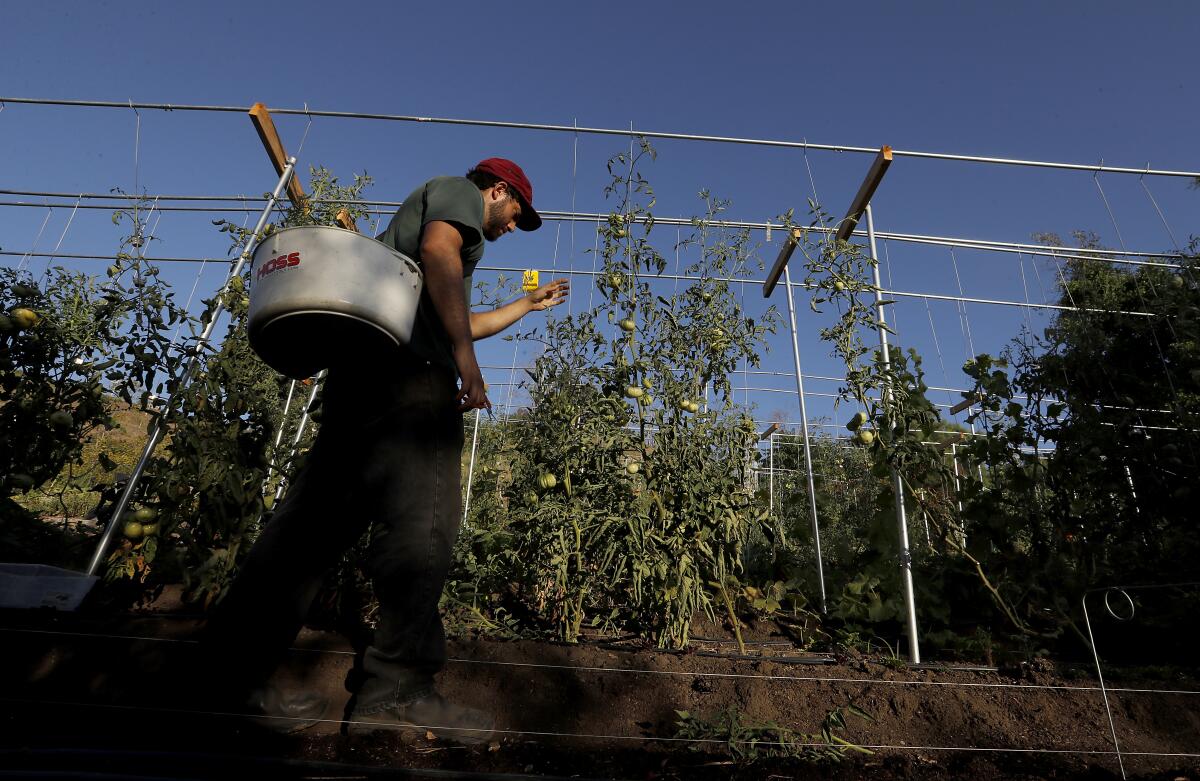
They spend their mornings in their field before Greer takes a seven-mile bicycle ride to work in East Hollywood and Tomassini drives to work in Bell. The days are long but Tomassini shrugs it off. “It’s like this for anybody who freelances or starts a small business,” he said. “You’re always working,”
Greer maintains that it’s a kind of a balm. “I’m an outdoors kid doing an indoors job most of the day,” she said. “That’s why gardening is so great.”
In the first year, they’ve cultivated about half their hill, but crammed as much as possible into that space. Towering tomato plants shade more tender sprouts of carrots and beets as well as flowers both edible and for restaurant bouquets. The lower levels are dotted with young fruit trees, like quince, crab apple and heirloom King David apples, as well as perennials like capers and peppercorns.
“The idea is to create a food forest,” Tomassini said, and the effect is impressive. Long rows of lettuce thrive despite the heat (their secret is drip irrigation, shade cloth and lots of compost for mulch). They use a trellis system and Dutch Qlipr clamps for their heirloom tomatoes — Costoluto Genovese, a delicious, ridged Italian variety and an old American favorite, Brandywine — and in late summer, the fruit is hanging heavy on the vines. Tomassini says they are harvesting 70 to 80 pounds of tomatoes a week for a variety of customers, such as Urban Homestead community-supported agriculture farm boxes, Eagle Rock Brewery Public House, as well as several private caterers, including Hank and Bean in Altadena.
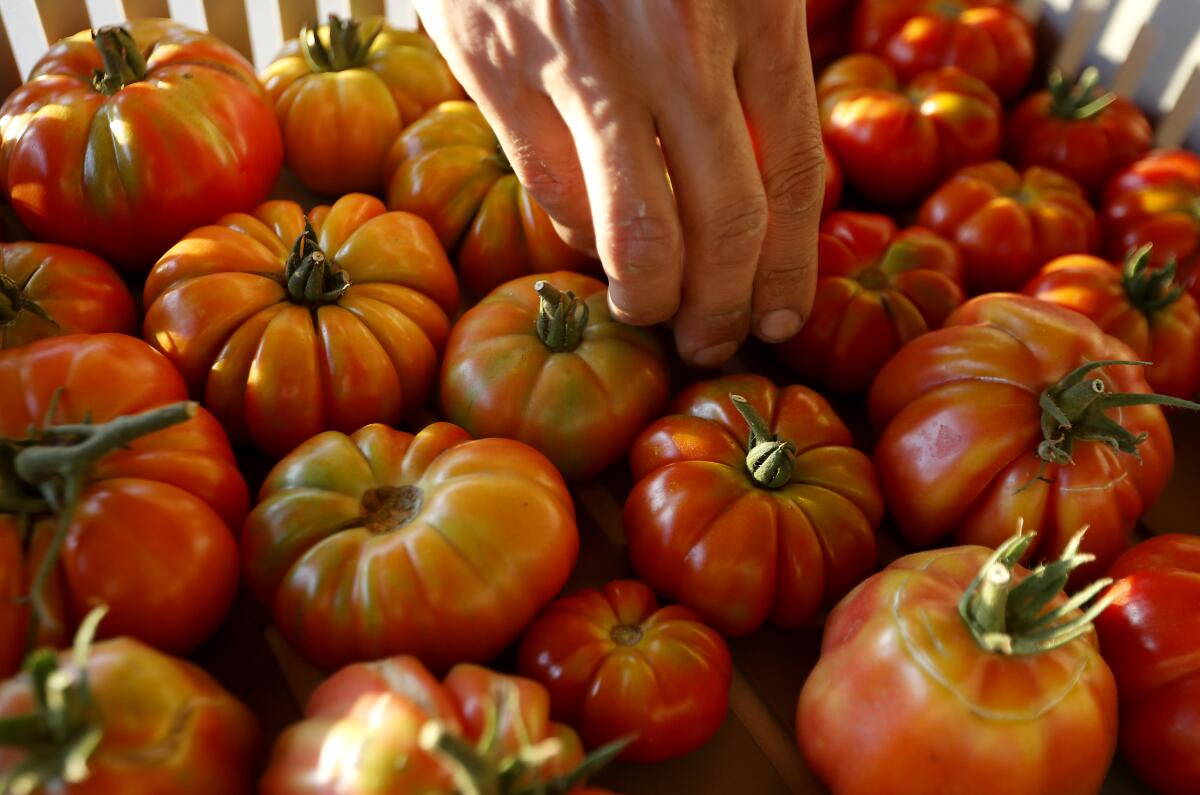
They don’t do it alone. Paul Everett, one of Tomassini’s former colleagues at Sqirl, helps on the farm part time, making deliveries when they’re at work, and Calli Goldstein, is an intern/volunteer. They also got a three-year grant from Kiss the Ground, a nonprofit farmland program, to study how the regular addition of amendments like compost and mulch benefit the soil. The grant pays for regular soil tests, Tomassini said, which would be difficult for them to afford on their own.
And most important for Greer and Tomassini, Avenue 33 Farm hosts volunteer days, once a month (The next is Oct. 26). More than 20 adults and children visited last month for a tour and one of Tomassini’s simple meals in exchange for a few hours of weeding, trellising or other jobs.
The help is welcome, but getting people involved with farming is part of their vision. They see themselves as part of the Drawdown movement, which offers a multitude of small steps to reduce greenhouse gas emissions and reverse the effects of climate change. “We’re not going to feed everybody,” Tomassini said. “Our goal is to connect people with the food they eat, and a chance to get their hands in the ground.”
So yes, they are dreamers, yes, they have a vision, but don’t call it a mission. Greer’s eyes widen and she shakes her head when she’s asked if this is a mission. “No, no, we’re not trying to convert anybody,” she said.”For us, it’s more like being an example.... Plus, the closer you get to your food, the better you eat!”
INFO BOX
What: Avenue 33 Farm Volunteer Day
When: Saturday, Oct. 26
Where: Lincoln Heights. Register online to get directions and times.
Info: Follow on Instagram @ave33farm or join the email list at ave33farm.com.
More to Read
Sign up for our L.A. Times Plants newsletter
At the start of each month, get a roundup of upcoming plant-related activities and events in Southern California, along with links to tips and articles you may have missed.
You may occasionally receive promotional content from the Los Angeles Times.

